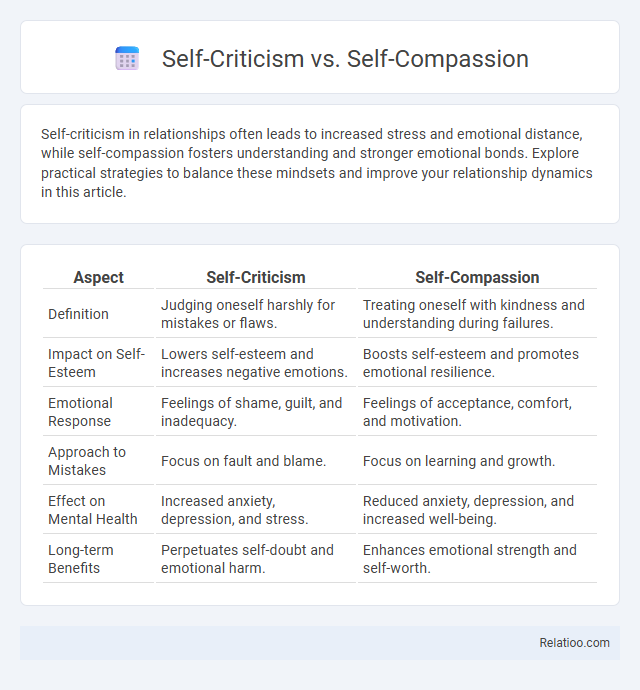Self-criticism in relationships often leads to increased stress and emotional distance, while self-compassion fosters understanding and stronger emotional bonds. Explore practical strategies to balance these mindsets and improve your relationship dynamics in this article.
Table of Comparison
| Aspect | Self-Criticism | Self-Compassion |
|---|---|---|
| Definition | Judging oneself harshly for mistakes or flaws. | Treating oneself with kindness and understanding during failures. |
| Impact on Self-Esteem | Lowers self-esteem and increases negative emotions. | Boosts self-esteem and promotes emotional resilience. |
| Emotional Response | Feelings of shame, guilt, and inadequacy. | Feelings of acceptance, comfort, and motivation. |
| Approach to Mistakes | Focus on fault and blame. | Focus on learning and growth. |
| Effect on Mental Health | Increased anxiety, depression, and stress. | Reduced anxiety, depression, and increased well-being. |
| Long-term Benefits | Perpetuates self-doubt and emotional harm. | Enhances emotional strength and self-worth. |
Understanding Self-Criticism: Definition and Origins
Self-criticism involves harsh self-evaluation and negative judgment rooted in past experiences and internalized societal expectations, often leading to diminished self-esteem and increased stress. Understanding self-criticism requires exploring its psychological origins, such as upbringing, perfectionism, and cognitive distortions influenced by early attachment patterns and critical environments. Differentiating self-criticism from self-compassion and self-esteem highlights how self-compassion promotes emotional resilience by fostering kindness and acceptance while self-esteem centers on self-worth evaluation.
The Psychology Behind Self-Compassion
The psychology behind self-compassion reveals its role in fostering emotional resilience by encouraging kindness toward oneself during moments of failure or hardship, contrasting sharply with self-criticism, which often leads to increased stress and decreased motivation. Unlike self-criticism, which triggers the brain's threat response, self-compassion activates areas involved in soothing and contentment, promoting mental well-being and reducing negative self-judgment. Research from the University of Texas demonstrates that individuals practicing self-compassion experience lower levels of anxiety and depression, as well as improved coping mechanisms, highlighting its significance in psychological health.
Key Differences: Self-Criticism vs Self-Compassion
Self-criticism involves harsh judgment and negative self-talk that can undermine your confidence and increase stress, while self-compassion encourages kindness, understanding, and acceptance toward yourself during difficult times. Unlike self-criticism, self-compassion fosters emotional resilience and promotes mental well-being by recognizing that imperfection is part of the shared human experience. Embracing self-compassion over self-criticism leads to healthier self-regulation and improved overall psychological health.
Impact on Mental Health and Well-being
Self-criticism often leads to increased stress, anxiety, and depression, negatively impacting mental health and overall well-being. In contrast, self-compassion fosters resilience, emotional regulation, and a positive self-image, which enhances psychological well-being and reduces symptoms of mental distress. Your emotional health benefits more significantly from cultivating self-compassion rather than engaging in harsh self-criticism.
Effects on Motivation and Personal Growth
Self-criticism often undermines Your motivation by fostering negative self-perceptions and increasing stress, which can hinder personal growth. In contrast, self-compassion promotes resilience and encourages a growth mindset by allowing you to acknowledge mistakes without harsh judgment. Balancing self-criticism and self-compassion optimizes motivation by driving improvement while maintaining emotional well-being.
How Self-Criticism Sabotages Success
Self-criticism sabotages success by fostering negative self-talk that undermines confidence and motivation, leading to avoided challenges and decreased performance. In contrast, self-compassion promotes resilience, allowing you to learn from mistakes without harsh judgment, which enhances growth and productivity. Embracing self-compassion instead of self-criticism helps maintain emotional well-being and unlocks your full potential for achieving goals.
Benefits of Practicing Self-Compassion
Practicing self-compassion promotes emotional resilience by reducing negative self-judgment and fostering a kinder internal dialogue, which enhances overall mental well-being. Unlike self-criticism, which often leads to increased stress and decreased motivation, self-compassion encourages growth and self-improvement through understanding and acceptance. Your ability to cope with challenges and maintain a positive mindset significantly improves by cultivating self-compassion.
Recognizing Harmful Self-Talk Patterns
Recognizing harmful self-talk patterns involves identifying when your inner dialogue is dominated by self-criticism, which often leads to negative emotions and decreased motivation. Self-compassion encourages replacing these destructive thoughts with kinder, more supportive messages, fostering emotional resilience and personal growth. Understanding the difference between self-criticism and self-compassion empowers you to create healthier mental habits that promote well-being.
Practical Techniques to Cultivate Self-Compassion
Practicing self-compassion involves techniques like mindful self-awareness, where individuals observe their thoughts without judgment, and self-kindness, encouraging gentle self-talk during challenges. Writing compassionate letters to oneself can reinforce positive regard, while guided meditations focused on self-compassion help reduce harsh self-criticism. Integrating these methods fosters emotional resilience, contrasting the detrimental effects of excessive self-criticism by promoting balanced self-acceptance.
Embracing Change: Transforming Self-Criticism into Self-Compassion
Embracing change requires transforming self-criticism into self-compassion, which fosters emotional resilience and personal growth. Self-criticism often triggers negative thought patterns that hinder progress, while self-compassion encourages understanding and patience toward your own imperfections. Adopting self-compassion allows you to navigate change with greater ease and a healthier mindset.

Infographic: Self-criticism vs Self-compassion
 relatioo.com
relatioo.com